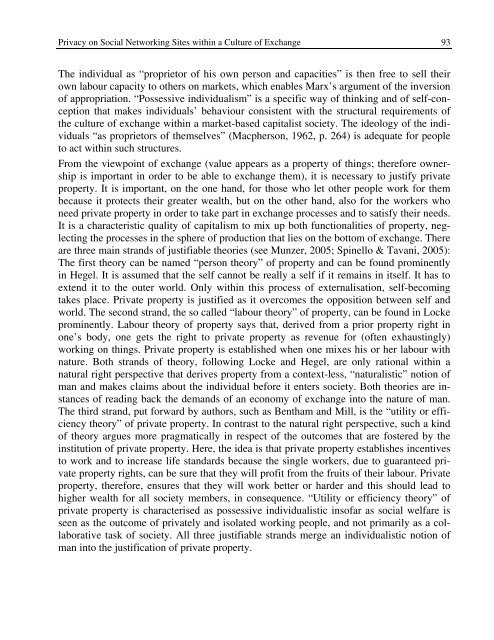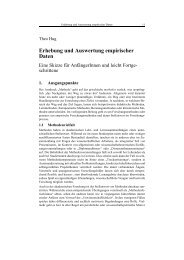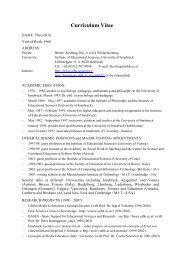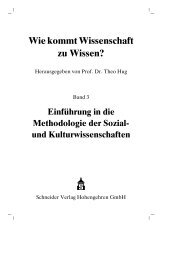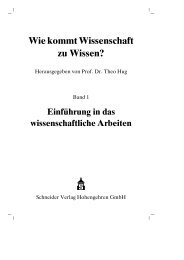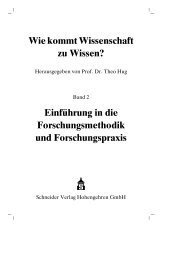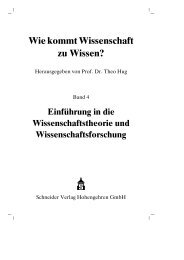Cultures and Ethics of Sharing - Universität Innsbruck
Cultures and Ethics of Sharing - Universität Innsbruck
Cultures and Ethics of Sharing - Universität Innsbruck
- Keine Tags gefunden...
Erfolgreiche ePaper selbst erstellen
Machen Sie aus Ihren PDF Publikationen ein blätterbares Flipbook mit unserer einzigartigen Google optimierten e-Paper Software.
Privacy on Social Networking Sites within a Culture <strong>of</strong> Exchange 93The individual as “proprietor <strong>of</strong> his own person <strong>and</strong> capacities” is then free to sell theirown labour capacity to others on markets, which enables Marx’s argument <strong>of</strong> the inversion<strong>of</strong> appropriation. “Possessive individualism” is a specific way <strong>of</strong> thinking <strong>and</strong> <strong>of</strong> self-conceptionthat makes individuals’ behaviour consistent with the structural requirements <strong>of</strong>the culture <strong>of</strong> exchange within a market-based capitalist society. The ideology <strong>of</strong> the individuals“as proprietors <strong>of</strong> themselves” (Macpherson, 1962, p. 264) is adequate for peopleto act within such structures.From the viewpoint <strong>of</strong> exchange (value appears as a property <strong>of</strong> things; therefore ownershipis important in order to be able to exchange them), it is necessary to justify privateproperty. It is important, on the one h<strong>and</strong>, for those who let other people work for thembecause it protects their greater wealth, but on the other h<strong>and</strong>, also for the workers whoneed private property in order to take part in exchange processes <strong>and</strong> to satisfy their needs.It is a characteristic quality <strong>of</strong> capitalism to mix up both functionalities <strong>of</strong> property, neglectingthe processes in the sphere <strong>of</strong> production that lies on the bottom <strong>of</strong> exchange. Thereare three main str<strong>and</strong>s <strong>of</strong> justifiable theories (see Munzer, 2005; Spinello & Tavani, 2005):The first theory can be named “person theory” <strong>of</strong> property <strong>and</strong> can be found prominentlyin Hegel. It is assumed that the self cannot be really a self if it remains in itself. It has toextend it to the outer world. Only within this process <strong>of</strong> externalisation, self-becomingtakes place. Private property is justified as it overcomes the opposition between self <strong>and</strong>world. The second str<strong>and</strong>, the so called “labour theory” <strong>of</strong> property, can be found in Lockeprominently. Labour theory <strong>of</strong> property says that, derived from a prior property right inone’s body, one gets the right to private property as revenue for (<strong>of</strong>ten exhaustingly)working on things. Private property is established when one mixes his or her labour withnature. Both str<strong>and</strong>s <strong>of</strong> theory, following Locke <strong>and</strong> Hegel, are only rational within anatural right perspective that derives property from a context-less, “naturalistic” notion <strong>of</strong>man <strong>and</strong> makes claims about the individual before it enters society. Both theories are instances<strong>of</strong> reading back the dem<strong>and</strong>s <strong>of</strong> an economy <strong>of</strong> exchange into the nature <strong>of</strong> man.The third str<strong>and</strong>, put forward by authors, such as Bentham <strong>and</strong> Mill, is the “utility or efficiencytheory” <strong>of</strong> private property. In contrast to the natural right perspective, such a kind<strong>of</strong> theory argues more pragmatically in respect <strong>of</strong> the outcomes that are fostered by theinstitution <strong>of</strong> private property. Here, the idea is that private property establishes incentivesto work <strong>and</strong> to increase life st<strong>and</strong>ards because the single workers, due to guaranteed privateproperty rights, can be sure that they will pr<strong>of</strong>it from the fruits <strong>of</strong> their labour. Privateproperty, therefore, ensures that they will work better or harder <strong>and</strong> this should lead tohigher wealth for all society members, in consequence. “Utility or efficiency theory” <strong>of</strong>private property is characterised as possessive individualistic ins<strong>of</strong>ar as social welfare isseen as the outcome <strong>of</strong> privately <strong>and</strong> isolated working people, <strong>and</strong> not primarily as a collaborativetask <strong>of</strong> society. All three justifiable str<strong>and</strong>s merge an individualistic notion <strong>of</strong>man into the justification <strong>of</strong> private property.


